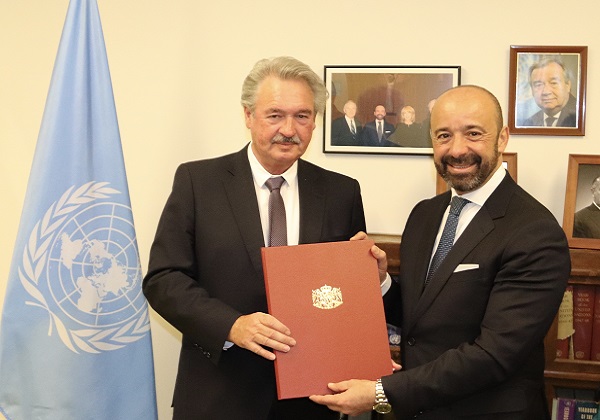 L-R: Luxembourg Foreign Affairs Minister Jean Asselborn; Under-Secretary-General for Legal Affairs and UN Legal Counsel Miguel de Serpa Soares;
Credit: MAEE
L-R: Luxembourg Foreign Affairs Minister Jean Asselborn; Under-Secretary-General for Legal Affairs and UN Legal Counsel Miguel de Serpa Soares;
Credit: MAEE
Luxembourg has become the first State party to ratify Article 8 of the Rome Statute of the International Criminal Court, criminalising the use of weapons with biological or toxic agents.
During his working visit to the UN headquarters in New York, on 1 and 2 April 2019, Luxembourg Minister of Foreign and European Affairs Jean Asselborn ratified Article 8 of the Rome Statute of the International Criminal Court.
On Monday 1 April 2019, Minister Asselborn met with Miguel Ángel Moratinos, the UN High Representative for the Alliance of Civilisations, for the first time. The meeting focused on the international political events as they discussed their thoughts and proposals for action to achieve better coexistence among communities, including in the Middle East region.
On Tuesday 2 April 2019, Minister Asselborn deposited the instrument of ratification amendments of Article 8 of the Rome Statute with the Secretary-General of the UN, representedby Miguel de Serpa Soares, Under-Secretary-General for Legal Affairs and Legal Counsel of the UN. These amendments are intended to complete the list of war crimes under Article 8 of the Rome Statute, by criminalising the use of weapons that use biological or toxin agents, weapons injuring with shards that are not X-ray located in the human body and laser weapons causing permanent blindness.
With the deposit of the instrument of ratification, which follows the adoption of the corresponding law by the Chamber of Deputies on 13 March 2019, Luxembourg has become the first State party to the Rome Statute to ratify these amendments, which is testimony to its commitment to international criminal justice and respect for international humanitarian law.








